Swimming is one of the most physically demanding sports, requiring a well-rounded diet and strategic nutrition to optimize performance. This article explores how swimmers can tailor their diet and workout routines to achieve maximum results, ensuring they are fueled effectively for both training and competition.
Key Takeaways
- A balanced diet rich in carbohydrates, proteins, and healthy fats is essential for swimmers to maintain energy and support muscle repair.
- Hydration is crucial, not only during training but before and after, to maintain optimal performance and recovery.
- Timing of meals plays a significant role, with pre-swim meals focusing on carbohydrates for energy and post-swim meals emphasizing protein for muscle recovery.
- Incorporating a variety of foods, including lean proteins, fruits, vegetables, and whole grains, ensures a nutrient-rich diet that supports a swimmer’s health and performance.
- Consulting with a sports nutritionist can help tailor a diet plan to individual needs, optimizing nutrition based on training load and goals.
Fueling for the Pool: What to Eat for Optimal Performance
Balancing Macronutrients: Carbs, Proteins, and Fats
When it comes to fueling your body for peak performance in the pool, a balanced diet is key. As a swimmer, you need a combination of carbohydrates, proteins, healthy fats, vegetables, fruits, whole grains, vitamins, and minerals to meet your nutritional requirements and power through your training sessions and races.
Timing Your Meals: Pre and Post Swim Strategies
To kick-start your performance for the day, I recommend starting your morning with a nutritious breakfast or a light snack. This will provide you with the necessary energy and nutrients to maximize your performance in the pool. Remember, the key is to experiment and find what works best for your body. Every swimmer is unique, and it may take some trial and error to discover the pre-swimming nutrition routine that suits you best.
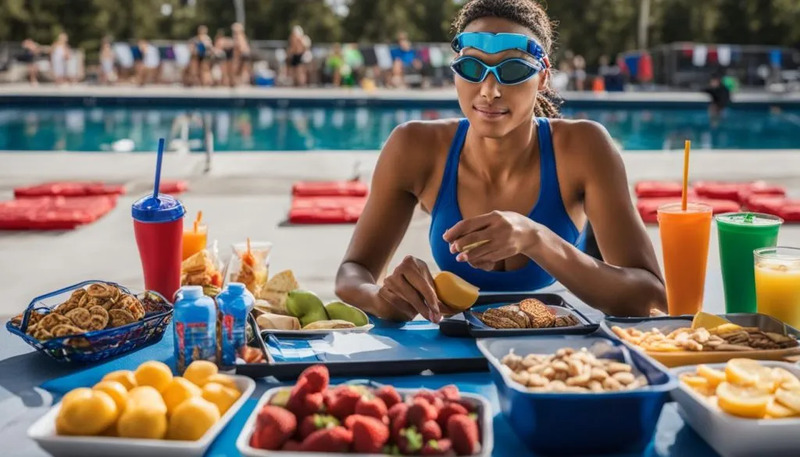
Pre post before swimming
Hydration: Not Just Water, Timing Matters Too
“Fuel your body with the right nutrients to optimize your strength and energy levels in the pool.”
Hydration is crucial for swimmers, and fluid intake should be prioritized before, during, and after training and events. Staying hydrated helps maintain your performance level and prevents fatigue and injuries.
Building Your Swimmer’s Performance Plate
Lean Proteins and Why They’re Crucial
Protein is your muscle repair go-to after a grueling swim. Think chicken, fish, or plant-based options like lentils and chickpeas. Adequate protein intake is essential for muscle recovery and to prep your body for the next swim session.
Carbohydrates: The Swimmer’s Power Source
Carbs are your main energy source during intense training. From pasta to whole grains, make sure they’re a big part of your meal. They help you maintain energy levels and recover faster.
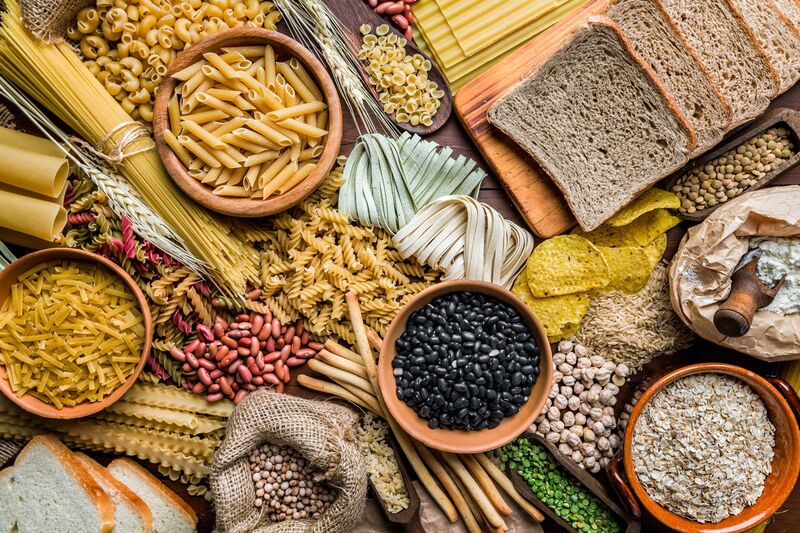
Carbohydrates is very important
Incorporating Fruits, Veggies, and Whole Grains
Don’t skimp on the greens or the whole grains! They’re packed with vitamins and minerals that support overall health and boost your immune system. A balanced plate with a variety of colors not only looks good but is good for you.
Remember, building a performance plate is not just about piling on the nutrients, but about creating a balanced meal that fuels your swim sessions and aids in recovery.
Pre-Swim Nutrition: Setting Yourself Up for Success
What to Eat Before You Dive In
Timing is key when it comes to pre-swim nutrition. Fueling your body with high-carbohydrate meals and snacks not only maximizes your performance but also ensures sustained energy throughout your swim. Consider foods like oatmeal, bananas, or a bagel with peanut butter about 1-2 hours before diving in.
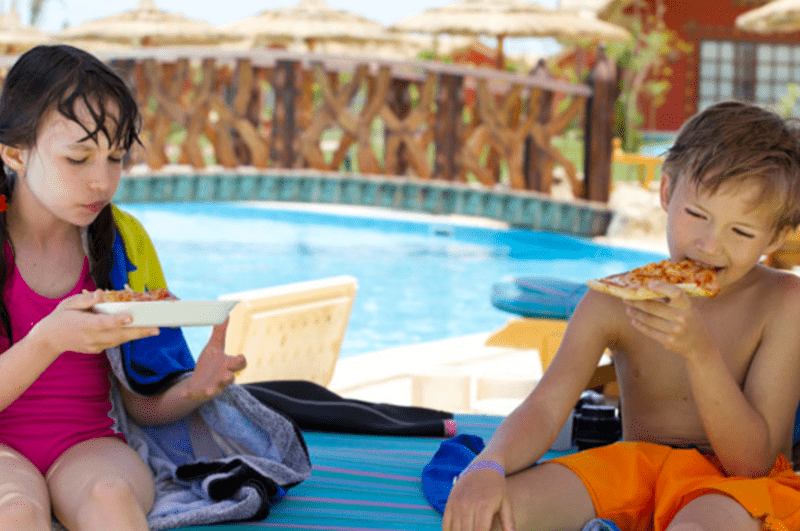
What to eat before swimming?
The Role of Snacks in Pre-Swim Energy
As a swimmer, being organized with your snacks is crucial. Pack energy bars, fruits, nuts, or yogurt to keep your energy levels up. These snacks are perfect for those moments when you need a quick boost before your swim.
Avoiding Common Dietary Mistakes
Be mindful of not overeating right before a swim to avoid discomfort and sluggishness in the pool. It’s also important to avoid foods that are high in fat and fiber close to swim time as they can lead to digestive issues.
By focusing on these pre-swim nutrition strategies, you’re setting yourself up for a successful and energetic performance in the pool.
Recovery Nutrition: What to Eat After a Swim
Proteins and Carbs for Muscle Repair
After you’ve pushed through those laps, your muscles are eager for repair and recovery. Proteins are crucial for muscle repair, while carbs help to refuel your energy stores. Think about grabbing a chicken wrap or a dairy-based fruit smoothie to hit these macronutrients effectively.
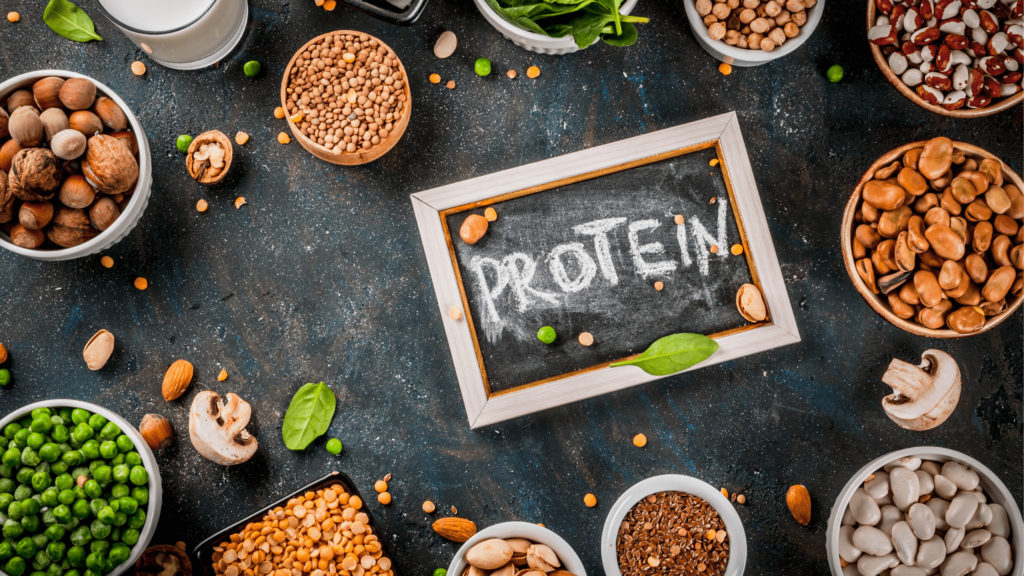
Proteins are crucial for muscle repair
The Importance of Immediate Post-Swim Meals
Timing is everything when it comes to recovery. Eating your recovery meal within 45 minutes after swimming can significantly enhance muscle recovery and energy replenishment. This window is your golden opportunity to kickstart the recovery process effectively.
Long-Term Recovery Foods
For ongoing recovery, it’s not just about what you eat immediately after your swim but also how you sustain nutrition throughout your training period. Incorporate a balanced diet with lean proteins, complex carbohydrates, and plenty of fruits and vegetables to support long-term health and performance.
Hydration Strategies for Swimmers
Understanding Fluid Needs Before, During, and After Swims
Hydration isn’t just about drinking water; it’s about knowing when and how much to drink to maintain peak performance. Swimmers should aim to hydrate consistently throughout the day, not just during swim sessions. Start hydrating at least two hours before diving in to ensure you’re well-prepped.
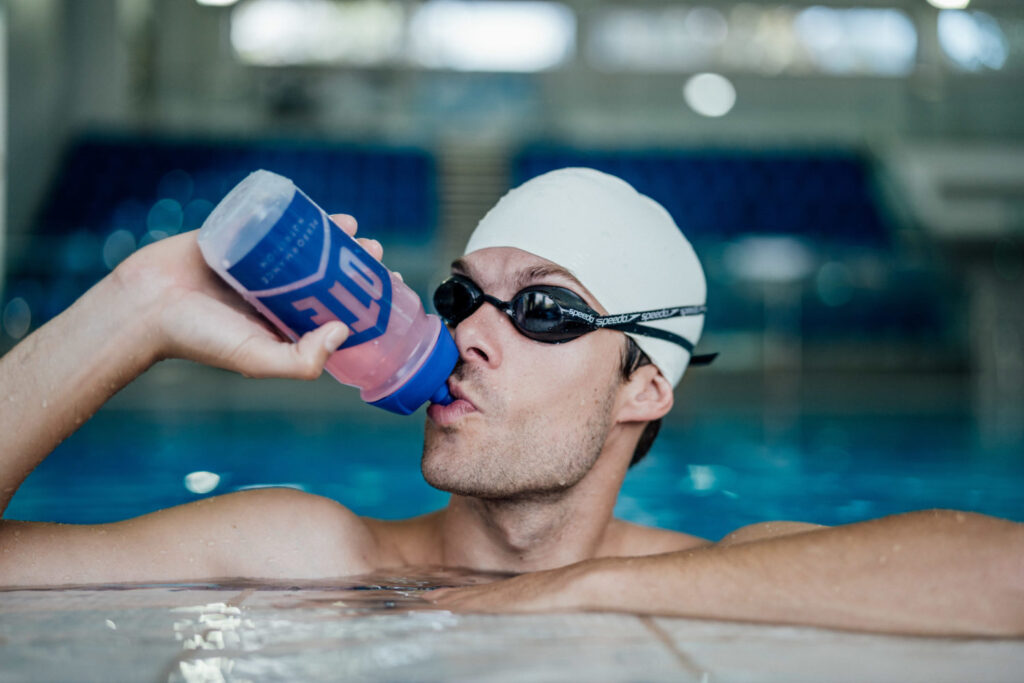
Swimmers should aim to hydrate consistently throughout the day
Electrolytes and Their Role in Performance
Electrolytes like sodium, potassium, and chloride are crucial for maintaining fluid balance and preventing cramps. Sodium is the most important electrolyte for hydration while others include potassium and chloride. It’s not just about water; including electrolyte-rich fluids can significantly boost your performance.
Best Practices for Staying Hydrated
To stay on top of your hydration game, follow these simple tips:
- Always have a water bottle at hand, especially during training.
- Monitor your hydration status by checking the color of your urine. Aim for a light straw color.
- Incorporate fluids that contain electrolytes, especially after intense training sessions to replenish what you’ve lost through sweat.
The Role of Supplements in a Swimmer’s Diet
When to Consider Supplements
Supplements can be a game-changer for swimmers, especially when dietary intake might not meet all nutritional needs due to intense training schedules. It’s crucial to consult with a sports nutritionist to determine the right timing and necessity for supplements.
Choosing the Right Supplements for Swimming
Selecting the right supplements involves understanding what your body needs to perform at its best. Here’s a quick rundown:
- Omega-3 Fatty Acids: Essential for reducing inflammation.
- Electrolytes: Crucial for maintaining hydration.
- Protein: Supports muscle repair and growth.
- Vitamin D: Important for bone health and immune function.
- Antioxidants: Help combat oxidative stress.
- Creatine: Can improve power and performance.
- Magnesium: Aids in muscle function and recovery.
Natural vs. Synthetic: What’s Best for Swimmers
Opt for natural supplements whenever possible as they are generally safer and more easily absorbed by the body. However, synthetic options might be necessary in some cases, and it’s important to choose products that are third-party tested for purity and safety.
Navigating Diet Challenges During Intense Training
Adjusting Caloric Intake as Training Demands Increase
As training intensity and volume ramp up, so should your caloric intake. It’s crucial to fuel your body adequately to meet the heightened energy demands. Consider the composition of your meals to ensure they’re giving you the right balance of nutrients.
Dealing with Common Digestive Issues
Intense training can sometimes lead to digestive discomfort. Eating smaller, more frequent meals can help mitigate issues like bloating and indigestion. Remember, it’s not just about what you eat, but also how and when you eat that can affect your digestive health.
Balancing Diet with Rest and Recovery Periods
Your diet should complement your rest and recovery periods. During lighter training days or rest days, adjust your intake accordingly. This balance is essential for long-term athletic performance and health.
Pro Tip: Always listen to your body and adjust your diet based on how you feel during and after workouts.
As you push your limits with intense training, navigating your diet is crucial for peak performance. Visit our ‘Nutrition Strategies‘ section on Swim Time Log to explore expert advice and tailored nutrition plans that support your training goals. Dive into a world of enhanced performance and better health today!
Dive Into Success: Wrap-Up on Optimizing Swimmer’s Diet and Workout
As we’ve explored throughout this article, the right balance of nutrition and exercise is crucial for swimmers aiming for peak performance. Remember, it’s not just about the laps you clock in the pool but also about how you fuel and recover your body. Embrace a diet rich in carbohydrates, proteins, and healthy fats, and don’t forget the importance of hydration. Consult with a sports nutritionist to tailor your diet to your specific needs, and keep pushing your limits. Here’s to making every stroke count and achieving your personal bests!
AUTHOR
Sang Nguyen
Sang Nguyen is a former national swimmer for Vietnam who has transitioned into coaching. With a passion for fostering a healthy swimming community and connecting like-minded individuals,......Read More
BLOG
Maybe You Are Interested
Good Swim Meet Snacks: What to Eat for Optimal Performance
Good nutrition is crucial for swimmers to maintain energy, recover quickly, and perform at their...
Read More...Optimizing Your Performance: The Best Diet for Swimming Training
Optimizing your performance in swimming is not just about rigorous training; it’s equally crucial to...
Read More...Achieve Peak Performance with This Diet Chart for Swimmers
Whether you’re a novice or an expert swimmer, understanding the right diet is crucial for...
Read More...Eating Like a Champion: Exploring the Diet of Michael Phelps
Michael Phelps, renowned for his Olympic triumphs, has a diet as extraordinary as his swimming...
Read More...Muscle Gain for Swimmers: Tailoring Your Diet for Strength
Swimming is a demanding sport that requires a tailored approach to nutrition to support muscle...
Read More...A Comprehensive Diet Plan To Gain Weight For Swimmers
Swimming is a demanding sport that requires meticulous attention to nutritional needs to optimize performance,...
Read More...